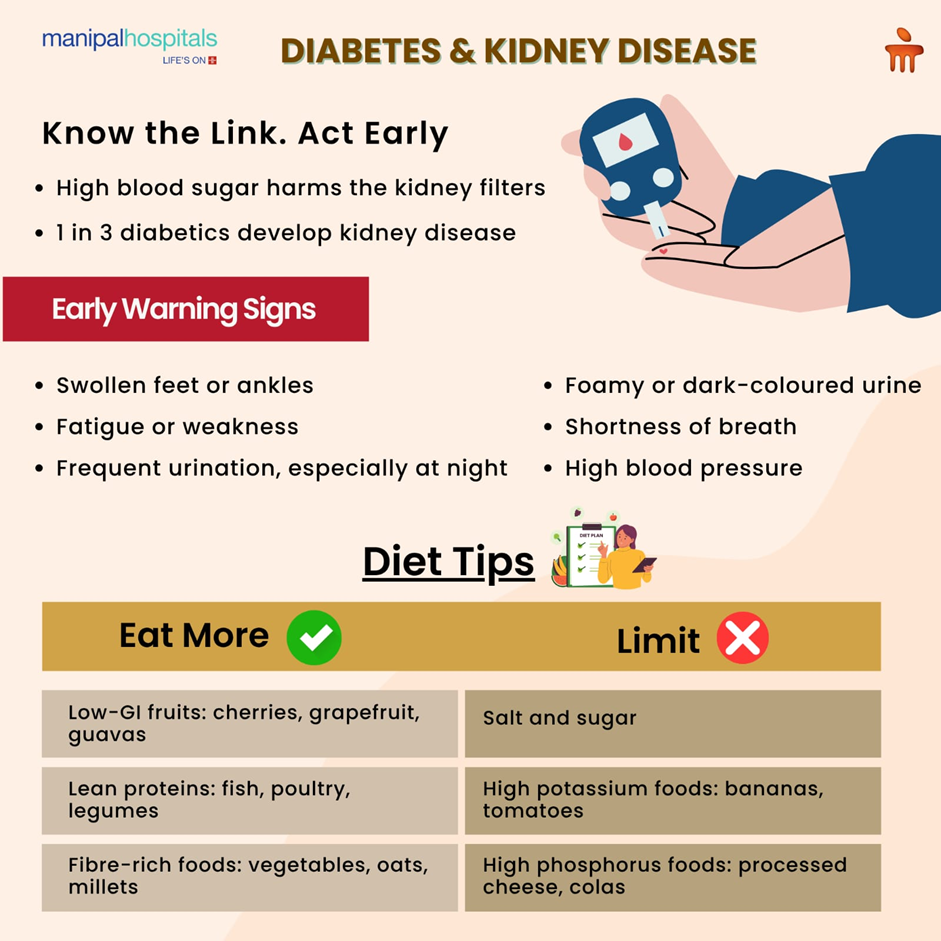The increasing number of people with diabetes worldwide is a major driving force for the growing kidney disease cases. Consistently high blood sugar levels can damage the kidneys, leading to diabetic kidney disease. This condition affects millions of people, making it crucial to understand how diabetes and kidney disease are linked and the steps you can take to reduce your risk of kidney damage. This blog explores current treatment approaches for diabetic kidney disease and appropriate dietary guidelines for patients with diabetes.
Synopsis
How Diabetes Leads to Kidney Disease?
Diabetes is a progressive disease that affects the way the body metabolises sugar, causing blood glucose to rise. Over time, high blood sugar levels cause damage to the tiny blood vessels in the kidneys, which prevents the kidneys from efficiently filtering out waste. Below are the principal means through which diabetes causes kidney disease:
-
High Blood Sugar and Kidney Damage: High blood sugar levels destroy the blood vessels of the kidneys, impairing their ability to filter waste and maintain fluid balance.
-
Increased Blood Pressure: High blood pressure, which often arises as a result of diabetes, accelerates kidney damage. It damages the kidneys by applying excessive pressure on their blood vessels, lowering their filtration efficiency.
-
Excessive Protein in Urine (Proteinuria): When kidney function worsens, the kidneys can leak excess protein into the urine. Proteinuria is a critical indicator of kidney damage among individuals with diabetes.
-
Reduced Kidney Filtration: As kidney function worsens, waste products start accumulating in the body, causing issues like fluid buildup and electrolyte imbalances.

Diabetic Kidney Disease Symptoms to Watch For
Diabetic kidney disease usually develops gradually and may not have any obvious symptoms early on. These are some of the general diabetic kidney disease symptoms to look out for:
-
Swelling (Edema): Edema in the ankles, legs, or Swollen feet is one of the typical signs of kidney disease. This happens because the kidneys are not able to efficiently get rid of excess fluid from the body.
-
Fatigue or Weakness: As kidney function decreases, waste products in the blood build up and cause tiredness and muscle weakness.
-
Frequent Urination at Night: Frequent urination at night (nocturia), which may be more than usual, is a common sign of kidney damage since the kidneys attempt to get rid of excess fluid.
-
Changes in Urine Colour or Consistency: Dark or foamy urine can be a sign of diabetic kidney disease when accompanied by other symptoms like swelling or tiredness.
-
Shortness of Breath: When fluid accumulates in the lungs, caused by poor kidney function, breathing becomes hard even during minor physical activity.
-
High Blood Pressure: Hypertension is both a cause and a result of kidney disease and can worsen kidney damage.
Diet for Kidney Disease and Diabetes
Nutrition plays an important role in the management of both kidney disease and diabetes. A well-balanced diet for kidney disease and diabetes can regulate blood sugar levels, minimise the strain on the kidneys, and avoid additional complications. Some dietary tips for diabetes and kidney disease management are mentioned below:
|
Control Carbohydrate Intake |
To help control blood sugar, focus on complex carbohydrates like whole grains, vegetables, and legumes. Avoid refined sugars and processed foods, which can cause blood sugar spikes. |
|
Limit Sodium |
Too much sodium can raise blood pressure and strain the kidneys. Reduce salt intake by avoiding processed foods and cooking with fresh herbs and spices. |
|
Monitor Protein Consumption |
Excessive protein intake can put added pressure on the kidneys. Consult with a dietitian to determine the right amount of protein for your needs, typically from lean sources like fish, poultry, and plant-based options. |
|
Increase Fibre |
A high-fibre diet helps stabilise blood sugar levels and promotes healthy digestion. Include plenty of fibre-rich foods like vegetables, fruits, and whole grains. |
|
Watch Potassium and Phosphorus Levels |
In advanced renal disease, managing potassium and phosphorus intake becomes essential to prevent harmful imbalances. Foods like bananas and tomatoes are high in potassium, so they should be consumed in moderation. |
|
Stay Hydrated |
Drinking enough water helps the kidneys eliminate waste from the body. However, if you have severe kidney disease, your experienced nephrologist in Bhubaneswar may recommend limiting fluid intake to prevent fluid retention. |
Conclusion
It’s important to understand how diabetes and kidney disease are related to prevent and manage both conditions. Diabetic kidney disease is a serious condition that can lead to kidney failure if left untreated, but with early intervention and proper care, its progression can be slowed. By managing blood sugar levels, controlling blood pressure, and following a balanced diet for kidney disease and diabetes, individuals with diabetes can significantly reduce their risk of kidney damage. Early detection, combined with a healthy lifestyle, is the key to preventing severe complications related to diabetic kidney disease.
FAQ's
Yes, diabetes can damage the small blood vessels in the kidneys. Over time, long-standing diabetes reduces the kidneys’ ability to filter waste and fluids, leading to kidney damage.
Early signs of diabetic kidney disease include swelling in the legs and feet, frequent urination, fatigue, and changes in the colour of urine.
To prevent kidney disease, keep your blood sugar levels under control. Apart from that, manage blood pressure and follow a healthy diet that can complement kidney health and diabetes management.
A diet rich in fibre, low in sodium, and moderate in protein is suitable for both diabetes and kidney disease. Include leafy greens, whole grains, and lean protein sources like fish and poultry.
While kidney disease treatment can slow the progression of damage, it cannot fully reverse the damage caused by diabetic kidney disease. Early intervention is key to managing the condition effectively.






















 5 Min Read
5 Min Read

















